- Home
- Courtney Milan
The Suffragette Scandal (The Brothers Sinister) Page 3
The Suffragette Scandal (The Brothers Sinister) Read online
Page 3
“There are a few small things already in motion,” his brother said airily, “but they’re of little consequence, and I’ll try to make sure they don’t hurt Stephen more than they must. Will that do?”
“Is that port over there?” Edward motioned to the other side of the room.
His brother turned away. “Why—no. It’s brandy.”
“Just as good. Pour us a glass, then, and we’ll drink to our accord.”
His brother crossed the room, a pleased smile on his face. No doubt he thought the whole thing had been worked out.
While James’s back was turned, Edward rolled the contents of the thick file he’d been perusing before James came in—newspaper clippings, letters, and all—into a bundle and stashed it inside his coat. He’d go through it all and slip it back in place by morning. James would never know.
All things being equal, Edward would rather not betray his little brother. Even after what James had done. But then, life was a series of hard choices. He could walk away from England and leave his best friend’s younger brother to the mercy of his family’s plan. Or he could make Miss Marshall’s better acquaintance and upset the whole thing.
He could see her in his mind’s eye for a moment—that all too delightful smile on her face. Call on me if you ever find yourself in need of an exclamation point.
No exclamation points.
But then, he’d never needed punctuation to get his revenge. He’d found lies and forgery to be much more effective tools.
Hell, he’d be doing Miss Marshall a favor. She didn’t need to know any of the details—and maybe, if he was lucky, he’d get that cuddle after all.
Chapter Three
Cambridge, a few days later
“ONCE IS COINCIDENCE. Twice is suspicious. Three times?” Frederica Marshall tapped her pen viciously against the pages of newsprint in front of her. “Three times demands an explanation. Well, my dears?”
Two women sat beside her, examining the pages for themselves. The room was warm—almost overly so—but they were all used to that by now. Lady Amanda Ellisford, one of Free’s dearest friends, sat on her right, frowning, her eyes darting back and forth between the two columns. Mrs. Alice Halifax, Free’s cousin, sat on the other side. Alice’s lips moved slightly; she took longer to read the words. Rather unsurprising as she’d only learned to read three years ago. But her face darkened as she did.
“It’s like looking at two gowns made from the same pattern,” Alice said. “Different cloth, different seamstress. But it’s still a copy.”
The headline of the article Free had written was “Why Women Should Vote.” The headline of the article opposite was “Why Women Shouldn’t Vote.”
Same number of paragraphs. Same arguments addressed in each paragraph—raised in hers, discarded in the opinion piece printed in the London Star. But the piece in the Star had been printed nine hours before Free’s newspaper had gone to press.
“Someone is going to notice,” Amanda said quietly. She chewed her lip nervously, and then sighed. “More than one someone. Once they do notice, they’ll talk.”
Well might Amanda be nervous. This was the third time that something like this had happened in the last month. The first, Free had dismissed as coincidence. The second had left her suspicious. But this? This looked like confirmation.
“I know just what they’ll say,” Alice said. “They’ll say women are capable of only aping men, that we do nothing but take the words that men write and put ‘not’ in front of them. They say it enough as it is.”
They’d say it in public this time though, with something that looked like proof. Free would get another spate of angry, accusing letters. Some of them would no doubt be ugly indeed. She shook her head, dispelling that thought. Ugly letters were inevitable. They came no matter what she did; they were the price for accomplishing anything. There was no point worrying about them.
“We need to figure out how this is happening. Three different papers echoing words that I’ve written, printing counterpoints to my pieces before we’ve even gone to press.” Free shook her head. “If it’s not a coincidence, it’s a deliberate attack. And if it’s a deliberate attack, someone has access to what I’ve written.”
“It could be someone going through our rubbish,” Amanda said. “Finding your drafts—that would do it.”
It would.
“Could be one of the staff,” Alice suggested.
“It could be anyone who comes through the building.” Amanda looked down. “Or anyone who gets one of our advance proofs. None of us have made an attempt to hide our work.”
No, they hadn’t. Free sighed and put her head in her hands, rubbing at her aching temples. Why should she have acted so mistrustfully? She didn’t want to suspect the women who worked with her, didn’t want to turn the friendly business that she had painstakingly built into a place of wariness and disbelief. It was hard work, making a place where women felt safe enough to trust one another. This sort of black suspicion could ruin everything they had accomplished.
No doubt that was why someone had done it.
“We’ll need stricter rules,” Amanda was saying. “Keep your drafts locked up, Free. No more circulating of the opinion pieces for wide comment among the women.”
“Make a list of people who might be responsible,” Alice said. “And we’ll think about how to determine who’s at fault. Once we know that, we can decide how to proceed.”
The door behind them opened, and a gust of wind entered the room. Free set her hand on the papers, holding them in place. The incoming air was fresh and sweet; they’d printed proofs that morning, and the steam engine had warmed the room enough that the breeze was welcome.
She recognized the man standing in the doorway. She’d spoken with him at the race the other day. He was tall, his hair salt-and-pepper, his eyes dark, moving about the room before coming to rest on her. Hard to judge his age; by his hair, she might have guessed as high as forty. But he hadn’t spoken like a man in the middle of his years. And he had a handsome bravado that would better fit a younger man.
He looked around the room with an air of interest, glancing from the tables in the front, where Free and her chief editors stood, to the troughs on the side of the room where they wet the paper, from the drums of press ink to the dark metal of the silent rotary press. One eyebrow rose, ever so slowly, in question.
Free straightened and came forward, holding out her hand. Not palm down, like a lady angling for a dance, but as a gentleman would under similar circumstances. Would he try to wring her bones to dust, to demonstrate his strength? Would he take her hand as if they were about to dance together? It was a test of sorts.
This man didn’t hesitate at all. He took her hand in his and gave it a firm pump.
“Mr. Edward Clark,” he told her.
She tried not to raise her eyebrows. Edward Clark was a solidly English name; his speech, while perfectly fluent, was tinged with the mildest hint of a French accent. She’d assumed he’d been born in France, but had lived in England long enough to lose all but the slightest hint of his native tongue. Maybe that was wrong.
“Miss Frederica Marshall,” she responded, although if he’d found his way to her place of business, he likely knew that already. “Can I help you?”
His gaze traveled to the table behind her. They’d been poring over the inner page of the newspaper; the printer’s plates sat on the table next to the proofs for anyone to see.
Amanda was right. Their next issue of the paper was hardly shrouded in secrecy. Anyone really could walk in and see it. But Mr. Clark didn’t remark on the paper. Instead, his mouth quirked up at the corner.
“You were being literal,” he said, gesturing at the cart that stood beside the table. “You do have a box of exclamation points.”
Now that he’d spoken a bit more, she found herself thinking him English. An Englishman who had lived in France awhile, perhaps?
She smiled. “Along with colons, semicolons, and commas.
All the punctuation a girl can dream of. But let’s start with the question mark. Surely you didn’t come here to ogle my movable type. Is there some way I might be of service?”
He looked back at her. She had the feeling that he knew precisely what he was doing—that when his eyes twinkled at her so merrily, he knew exactly the effect it had deep in her stomach.
Free rather enjoyed the feeling. There was nothing wrong with a man who enjoyed a light flirtation, and Mr. Clark was no hardship to look at. So long as he understood that it would go no further, they’d get on famously.
But he simply said, “I have a business proposition to put to you.”
She pursed her lips. “As a preliminary… This is a newspaper by women, for women, and about women. I’m unlikely to hire you to write a column.”
“I don’t write columns,” he said. “I can do some creditable illustrations, but I would make a dreadful employee. It’s not that sort of proposition. Is there somewhere we might discuss this in private?”
She gestured to the side of the room. “I have an office in here.”
He followed her. Her office was nothing more than a converted storage room—one where she’d had a portion of the wall adjoining the main room knocked out and replaced with glass, so that she might be able to have privacy for business meetings precisely like this while still leaving her safely in her employees’ view. He took in the surroundings—the old, chipped desk that she placed herself behind, the stack of grammatical texts and population reports on the bookshelf behind her. She realized, with a hint of chagrin, that a draft of yet another column—one that was scheduled to appear in three days’ time—sat out in plain sight. She placed a stack of blank paper on top of it and sat behind her desk.
But he was looking through the window out to the floor of her business. “The lady in the light blue,” he said in an idle tone, “I presume is Lady Amanda. And the woman with the pinched expression must be Mrs. Halifax.”
“Should I have performed introductions?”
“No,” he said. “I’m only making a point. I’ve done my research over the last few days. I know who you are.” Those last words came out low, and his eyes cut back to her as he spoke. They had a startling effect on Free—as if he were making a declaration, one that made her feel just a little fluttery inside.
It had been so long since anyone had made her feel fluttery. It felt like winter sunshine—something to be savored because it surely wouldn’t last. She hoped he didn’t say something awful to ruin it.
“Consider your point made,” she said with a nod. “You know who I am.”
“And when I came in,” he said, “the three of you were no doubt discussing the plot to discredit you. You’ve at least discovered what they’re doing with your editorials, then. Good for you, Miss Marshall. You’ve made my work that much easier.”
Free winced. “So you’ve noticed as well.” If he—a random man off the street—had made the connection, others would, too. It would only be a matter of time until someone wrote about it. She would have to figure out a course of action, and she had no time to waste.
“Noticed it?” He shook his head. “No, Miss Marshall. I was apprised of it.”
“So it’s already being discussed in public.” Damn it all. She didn’t need more to do. “Well, thank you for letting me know. We’ve no acquaintance to speak of, and I appreciate the warning. Now, if you’ll excuse me—” She began to rise.
“I won’t excuse you.” He gestured at her. “Sit down. This is not a matter of public discussion. My information comes directly from the man responsible for the copying.”
She paused, halfway frozen between sitting and standing.
“Directly from him?” she repeated.
“Yes,” he said. “I know many of his plans. He thinks I’m on his side. And it’s a lucky thing that I’m not, because if I actually were, you’d have no advance notice of what is about to happen. And that would be very, very bad for you.”
Free sank back into her chair.
“Shall we fetch your box of question marks?” he inquired. “It’s quite simple. There is a man who wants to do you harm. He trusts me enough to disclose his plans. As I don’t wish for him to do you harm, I offer you my help.”
He had such a lovely smile, such a warm manner. It was really too bad that it was all a lie.
Free shook her head. “Your story does not inspire trust. You don’t know me, and so I can’t believe you care what happens to me. A tale of some shadowy man who wishes me harm is entirely plausible. Half of England wishes me harm. Yet you offer no proof except information that I have already discovered. You claim that this man trusts you, but you’ve just offered to betray that trust. That tells me you are not trustworthy. I don’t know what you’re about, Mr. Clark, but go about it elsewhere.”
She expected that he would get a little angry in response. Men didn’t like to be called liars, especially when they were lying.
But he simply smiled and leaned back in his chair. “Good. You’re not as foolishly naïve as I’d originally supposed. That will make things a little easier. Let’s start with the basics. You’re right. I don’t know you, and I don’t give a damn what happens to you.” He said that with a brilliant smile on his face, one so at odds with his words that she had to remind herself what he’d said. He’d said it charmingly, sweetly, seductively even: He didn’t give a damn about her.
“That,” Free said, “is very likely the first true thing you’ve told me. If I can see through the flimsy allure of your charisma, I suspect others can, too. Why would anyone trust you enough to divulge their secret plots?”
He leaned forward. “Ah, that’s the thing, Miss Marshall. I come with sterling references.”
She looked him over dubiously. His jacket was not firmly pressed; it had been a few too many hours since his last shave. His hair was disreputably long. Those things could be fixed by a maid and a razor, but nonetheless… “You’ve just offered to double-cross the men you’re working with. What sort of references can you possibly have?”
“Well, that’s the beauty of it. I can have any references I want. Shall I show you one of my best ones?”
“By all means. I doubt it will change my mind.”
Instead of producing a letter from a pocket, he reached across her desk and filched a blank piece of paper from her stack. Then, before she could protest, he swiped her pen and inkwell.
“Let us see.” He looked off into the distance, tapping one end of the pen against his lip. And then he began to write. “To whom it may concern: I have had the opportunity to work with Edward Clark for many years. He is honest, upright, and intelligent. He will serve you well in all things.” He shrugged. “Normally, of course, I would be more effusive and specific. Specificity is the trick to a good forgery. But in this instance, the substance of the reference is not the point. It’s about the form.” He signed the paper with a flourish and slid it across the table to her with an easy grace.
“I just saw you write this myself,” she said. “Why would I believe…” And then she looked at the page. Really looked at it—at the letters before her, at the signature that he’d dashed off with such easy confidence. Her mouth went dry.
“Precisely the point,” he said. “You shouldn’t believe me. But perhaps, looking over this particular reference, you can understand why people rely on me.”
If she hadn’t seen him write it just now, she would have thought she had written it herself. That was her handwriting, her name. That precise carefree curve of the F, the casual loops of her last name… He’d captured them perfectly.
“I’m wanted by two governments for forgery,” he said cheerfully. “Luckily for me, one of them no longer exists. And the other, in case you are wondering, is not part of the British Commonwealth. You would not be harboring a known fugitive.”
“That may be so.” She pushed the paper away from her. “Maybe you could convince someone else to trust you. But after that demonstration, I am rather less like
ly to trust you than the reverse.”
“Excellent,” he said cheerily. “I’m not a trustworthy man. I’ve lied to you a half-dozen times over the course of this conversation, and I’ll no doubt do it again. For instance, the name I was born with is not Edward Clark—although I have used that name regularly for the last six years or so, and I think of it as mine now. By all means, Miss Marshall, don’t trust me. But do work with me. On this, our interests are aligned. You don’t want to be ruined, and I’d rather your enemy not ruin you either.”
“Why? You don’t give a damn about me.”
His smile didn’t slip, but it grew just a touch darker. “You’re right,” he said. “But as it turns out, my indifference to you is overbalanced by my dislike of him.”
Or—equally likely—he’d been tasked with charming her, learning her plans.
“No, thank you.” She smoothed her skirts over her lap and met his gaze directly. “I’ll take my chances on my own. I do not need help from a self-professed liar who might betray me at any moment.”
He sighed. “This would be far easier if you were less clever.” It sounded like a complaint, but he winked at her at the end. “Damn it, Miss Marshall, I’m trying to be a little honorable. But very well. Since I must.” He raised his eyes to her. “You need to work with me because I will betray you.”
She sucked her breath in. “Pardon?”
“How precarious is your position in society, Miss Marshall? You’re young, unmarried, and reasonably good-looking.” He said the last with no emotion, as if he were just reciting facts.
He was. She had to remember that. No matter how flirtatious his tone, that was all she meant to him: a collection of facts.
“I have two possible plans to foil my enemy. One is to work with you to defeat him. The other is to shut down your operations here so thoroughly that he doesn’t get the pleasure of doing it himself. A forged letter of credit sold to your enemy? A missive in your handwriting, written to a lover and indiscreetly left for someone else to find?” He shrugged. “It would take me half an afternoon to make your life utterly miserable and maybe a few days to make it impossible.”

 Her Every Wish
Her Every Wish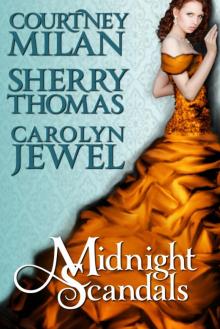 Midnight Scandals
Midnight Scandals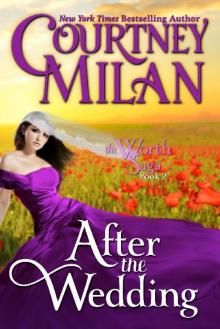 After the Wedding
After the Wedding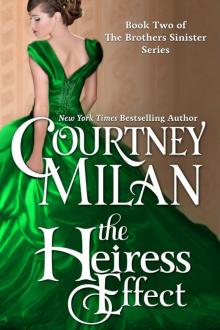 The Heiress Effect
The Heiress Effect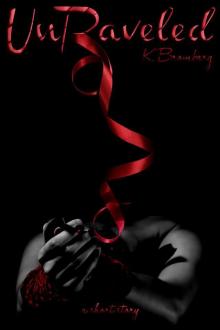 Unraveled
Unraveled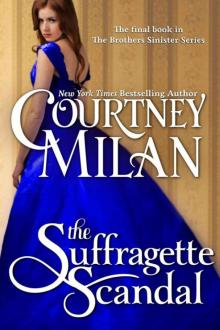 The Suffragette Scandal
The Suffragette Scandal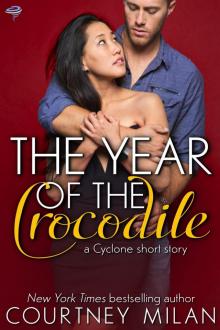 The Year of the Crocodile
The Year of the Crocodile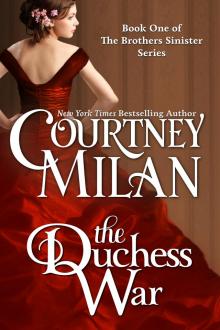 The Duchess War
The Duchess War What Happened at Midnight
What Happened at Midnight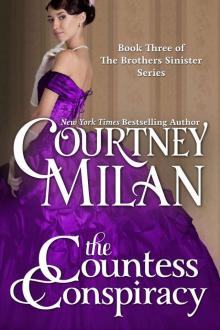 The Countess Conspiracy
The Countess Conspiracy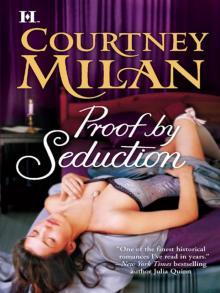 Proof by Seduction
Proof by Seduction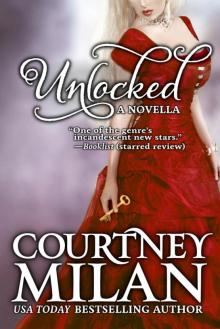 Unlocked
Unlocked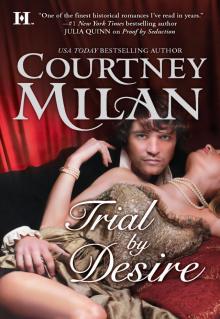 Trial by Desire
Trial by Desire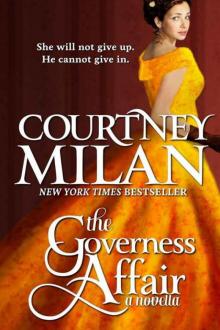 The Governess Affair
The Governess Affair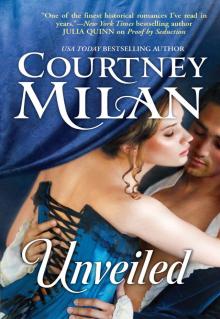 Unveiled
Unveiled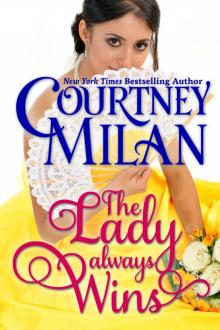 The Lady Always Wins
The Lady Always Wins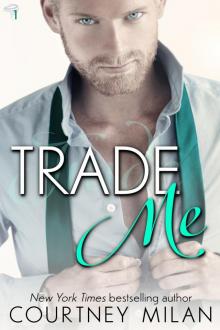 Trade Me
Trade Me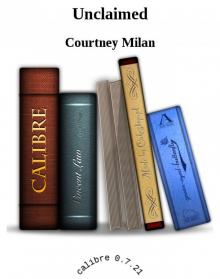 Unclaimed
Unclaimed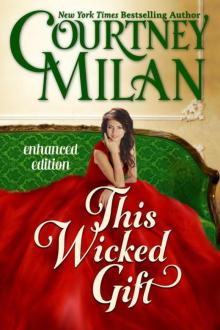 This Wicked Gift
This Wicked Gift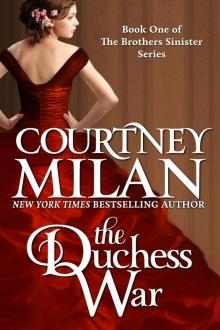 The Duchess War (The Brothers Sinister)
The Duchess War (The Brothers Sinister)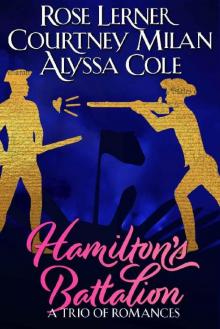 Hamilton's Battalion: A Trio of Romances
Hamilton's Battalion: A Trio of Romances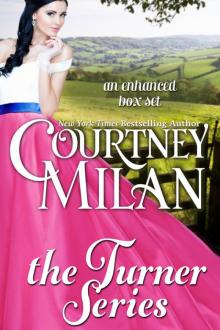 The Turner Series
The Turner Series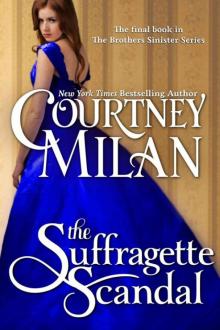 The Suffragette Scandal (The Brothers Sinister)
The Suffragette Scandal (The Brothers Sinister)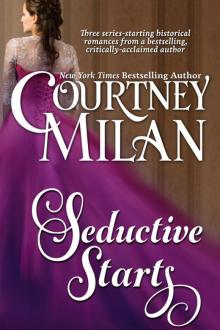 Seductive Starts
Seductive Starts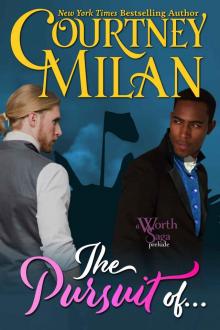 The Pursuit Of…
The Pursuit Of…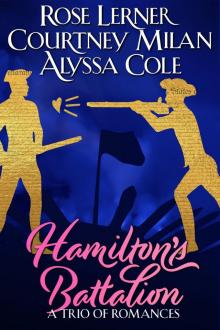 Hamilton's Battalion
Hamilton's Battalion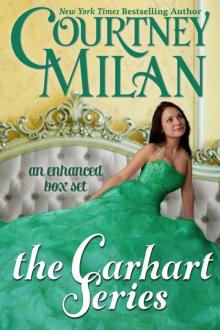 The Carhart Series
The Carhart Series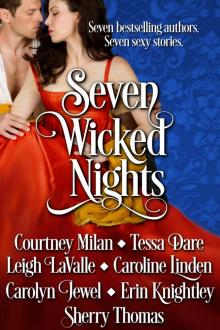 Seven Wicked Nights
Seven Wicked Nights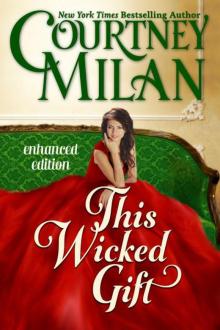 This Wicked Gift (A Carhart Series Novella)
This Wicked Gift (A Carhart Series Novella)